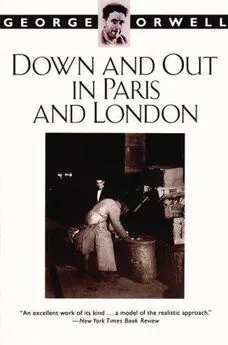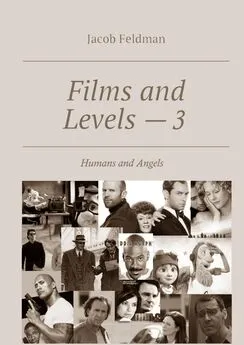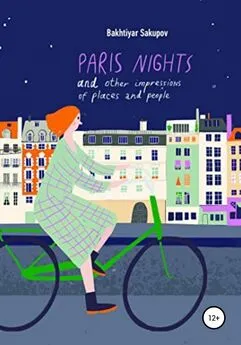George Orwell - Down and Out in Paris and London
- Название:Down and Out in Paris and London
- Автор:
- Жанр:
- Издательство:неизвестно
- Год:неизвестен
- ISBN:нет данных
- Рейтинг:
- Избранное:Добавить в избранное
-
Отзывы:
-
Ваша оценка:
George Orwell - Down and Out in Paris and London краткое содержание
Down and Out in Paris and London - читать онлайн бесплатно полную версию (весь текст целиком)
Интервал:
Закладка:
a cabin, so I slept in the saloon, together with most of
the third-class passengers. I find this entry in my diary
for that day:
"Sleeping in the saloon, twenty-seven men, sixteen
women. Of the women, not a single one has washed her
face this morning. The men mostly went to the bathroom;
the women merely produced vanity cases and covered the
dirt with powder.
Q ,. A secondary sexual difference?"
On the journey I fell in with a couple of Roumanians,
mere children, who were going to England on their
honeymoon trip. They asked innumerable questions
about England, and I told them some startling lies. I was
so pleased to be getting home, after being hard up for
months in a foreign city, that England seemed to me a
sort of Paradise. There are, indeed, many things in
England that make you glad to get home; bathrooms,
armchairs, mint sauce, new potatoes properly cooked,
brown bread, marmalade, beer made with veritable hops-
they are all splendid, if you can pay for them. England is
a very good country when you are not poor; and, of
course, with a tame imbecile to look after, I was not
going to be poor. The thought of not being poor made me
very patriotic. The more questions the Roumanians
asked, the more I praised England; the climate, the
scenery, the art, the literature, the laws-everything in
England was perfect.
Was the architecture in England good? the Rou-
manians asked. "Splendid!" I said. "And you should just
see the London statues! Paris is vulgar-half grandiosity
and half slums. But London-"
Then the boat drew alongside Tilbury pier. The first
building we saw on the waterside was one of those huge
hotels, all stucco and pinnacles, which stare from the
English coast like idiots staring over an asylum
wall. I saw the Roumanians, too polite to say anything,
cocking their eyes at the hotel. "Built by French
architects," I assured them; and even later, when the
train was crawling into London through the eastern
slums, I still kept it up about the beauties of English
architecture. Nothing seemed too good to say about
England, now that I was coming home and was not hard
up any more.
I went to B.'s office, and his first words knocked
everything to ruins. "I'm sorry," he said; "your employers
have gone abroad, patient and all. However, they'll be
back in a month. I suppose you can hang on till then?"
I was outside in the street before it even occurred to
me to borrow some more money. There was a month to
wait, and I had exactly nineteen and sixpence in hand.
The news had taken my breath away. For a long time I
could not make up my mind what to do. I loafed the day
in the streets, and at night, not having the slightest
notion of how to get a cheap bed in London, I went to a
"family" hotel, where the charge was seven and sixpence.
After paying the bill I had ten and twopence in hand.
By the morning I had made my plans. Sooner or later
I should have to go to B. for more money, but it seemed
hardly decent to do so yet, and in the meantime I must
exist in some hole-and-corner way. Past experience set
me against pawning my best suit. I would leave all my
things at the station cloakroom, except my second-best
suit, which I could exchange for some cheap clothes and
perhaps a pound. If I was going to live a month on thirty
shillings I must have bad clothes-indeed, the worse the
better. Whether thirty shillings could be made to last a
month I had no idea, not knowing London as I knew
Paris. Perhaps I could beg, or sell bootlaces, and I
remembered articles I had read in the Sunday papers about
beggars who have two thousand pounds sewn into their
trousers. It was, at any rate, notoriously impossible to
starve in London, so there was nothing to be anxious about.
To sell my clothes I went down into Lambeth, where
the people are poor and there are a lot of rag shops. At
the first shop I tried the proprietor was polite but
unhelpful; at the second he was rude; at the third he
was stone deaf, or pretended to be so. The fourth
shopman was a large blond young man, very pink all
over, like a slice of ham. He looked at the clothes I was
wearing and felt them disparagingly between thumb and
finger.
"Poor stuff," he said, "very poor stuff, that is." (It was
quite a good suit.) "What yer want for 'em?"
I explained that I wanted some older clothes and as
much money as he could spare. He thought for a moment,
then collected some dirty-looking rags and threw them on
to the counter. "What about the money?" I said, hoping for
a pound. He pursed his lips, then produced a
shilling and
laid it beside the clothes. I did not argue-I was going to
argue, but as I opened my mouth he reached out as
though to take up the shilling again; I saw that I was
helpless. He let me change in a small room behind the
shop.
The clothes were a coat, once dark brown, a pair of
black dungaree trousers, a scarf and a cloth cap; I had
kept my own shirt, socks and boots, and I had a comb and
razor in my pocket. It gives one a very strange feeling to be
wearing such clothes. I had worn bad enough things
before, but nothing at all like these; they were not merely
dirty and shapeless, they had - how is one to express it?-a
gracelessness, a patina of antique filth, quite different
from mere shabbiness.
They were the sort of clothes you see on a bootlace seller,
or a tramp. An hour later, in Lambeth, I saw a hang-dog
man, obviously a tramp, coming towards me, and when I
looked again it was myself, reflected in a shop window.
The dirt was plastering my face already. Dirt is a great
respecter of persons; it lets you alone when you are well
dressed, but as soon as your collar is gone it flies towards
you from all directions.
I stayed in the streets till late at night, keeping on the
move all the time. Dressed as I was, I was half afraid that
the police might arrest me as a vagabond, and I dared not
speak to anyone, imagining that they must notice a
disparity between my accent and my clothes. (Later I
discovered that this never happened.) My new clothes had
put me instantly into a new world. Everyone's demeanour
seemed to have changed abruptly. I helped a hawker pick
up a barrow that he had upset. "Thanks, mate," he said
with a grin. No one had called me mate before in my life-it
was the clothes that had done it. For the first time I
noticed, too, how the attitude of women varies with a
man's clothes. When a badly dressed man passes them
they shudder away from him with a quite frank movement
of disgust, as though he were a dead cat. Clothes are
powerful things. Dressed in a tramp's clothes it is very
difficult, at any rate for the first day, not to feel that you
are genuinely degraded. You might feel the same shame,
irrational but very real, your first night in prison.
At about eleven I began looking for a bed. I had read
about doss-houses (they are never called dosshouses, by
the way), and I supposed that one could get a bed for
fourpence or thereabouts. Seeing a man, a navvy or
something of the kind, standing on the kerb in the
Waterloo Road, I stopped and questioned him.
I said that I was stony broke and wanted the cheapest
bed I could get.
"Oh," said he, "you go to that 'ouse across the street
there, with the sign 'Good Beds for Single Men.' That's a
good kip [sleeping place], that is. I bin there myself on and
off You'll find it cheap
and clean."
It was a tall, battered-looking house, with dim lights in
all the windows, some of which were patched with brown
paper. I entered a stone passage-way, and a little etiolated
boy with sleepy eyes appeared from a door leading to a
cellar. Murmurous sounds came from the cellar, and a
wave of hot air and cheese. The boy yawned and held out
his hand.
"Want a kip? That'll be a 'og, guv'nor."
I paid the shilling, and the boy led me up a rickety
unlighted staircase to a bedroom. It had a sweetish reek of
paregoric and foul linen; the windows seemed to be tight
shut, and the air was almost suffocating at first. There
was a candle burning, and I saw that the room measured
fifteen feet square by eight high, and had eight beds in it.
Already six lodgers were in bed, queer lumpy shapes with
all their own clothes, even their boots, piled on top of
them. Someone was coughing in a loathsome manner in
one corner.
When I got into the bed I found that it was as hard as a
board, and as for the pillow, it was a mere hard cylinder
like a block of wood. It was rather worse than sleeping on
a table, because the bed was not six feet long, and very
narrow, and the mattress was convex, so that one had to
hold on to avoid falling out. The sheets stank so horribly
of sweat that I could not bear them near my nose. Also,
the bedclothes only consisted of the sheets and a cotton
counterpane, so that though stuffy it was none too warm.
Several noises recurred throughout the night. About once
in an hour the man on my left a sailor, I think-woke up,
swore vilely, and lighted a cigarette. Another man, victim
of a bladder disease, got up and noisily used his chamber-pot
half a dozen times during the night. The man in the corner
had a coughing fit once in every twenty minutes, so regularly
that one came to listen for it as one listens for the next
yap when a dog is baying the moon. It was an unspeakably
repellent sound; a foul bubbling and retching, as though the
man's bowels were being churned up within him. Once when he
struck a match I saw that he was a very old man, with a grey,
sunken face like that of a corpse, and he was wearing his
trousers wrapped round his head as a nightcap, a thing
which for some reason disgusted me very much. Every
time he coughed or the other man swore, a sleepy voice
from one of the other beds cried out:
"Shut up! Oh, for Christ's ------
sake shut up!"
I had about an hour's sleep in all. In the morning I was
woken by a dim impression of some large brown thing
coming towards me. I opened my eyes and saw that it was
one of the sailor's feet, sticking out of bed close to my
face. It was dark brown, quite dark brown like an Indian's,
with dirt. The walls were leprous, and the sheets, three
weeks from the wash, were almost raw umber colour. I got
up, dressed and went downstairs. In the cellar were a row
of basins and two slippery roller towels. I had a piece of
soap in my pocket, and I was going to wash, when I
noticed that every basin was streaked with grime-solid,
sticky filth as black as boot-blacking. I went out
unwashed. Altogether, the lodging-house had not come up
to its description as cheap and clean. It was however, as I
found later, a fairly representative lodging-house.
I crossed the river and walked a long way eastward,
finally going into a coffeeshop on Tower Hill. Anfinally
going into a coffee-shop on Tower Hill. An
ordinary London coffee-shop, like a thousand others, it
Читать дальшеИнтервал:
Закладка:









